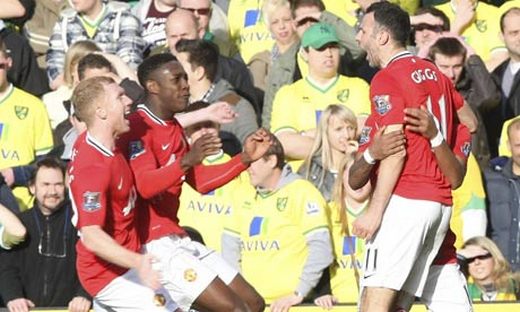News
Golden oldies Ryan Giggs and Paul Scholes are still a smash hit

Like Lennon and McCartney, the hits keep coming for Ryan Giggs and Paul Scholes. The two masters of Old Trafford scored the goals in Manchester United's 2-1 win at Norwich City last Sunday and their genius will be thrust to the fore at Tottenham Hotspur.
In the Premier League match that Sir Alex Ferguson has marked as one to "survive", the United manager will trust the pair with 1,587 senior appearances between them to steer his title-chasing side in the cauldron of a Sunday afternoon at White Hart Lane.
How Giggs and Scholes have kept on running for so long is a small miracle, and may spawn countless sport science theses in future years. Diet, yoga, a recalibration of their games – United's ambition is that their players should emulate Milan's for longevity. Other factors such as leaving international football early and the shock of premature retirement – in Scholes's case – are additional factors keeping their distinguished veterans in peak condition.
Primarily, the Premier League's longest-running show speaks of Giggs's and his younger sidekick's adoration for the buzz of competition. "Without a doubt the biggest thing is a love of football – that's what kept them going so long," says Eric Harrison, the United youth-team coach who brought through the fabled group of Giggs, Scholes, David Beckham, the Neville brothers and Nicky Butt. "They just love training and playing football. Even though they're getting on a bit they are still important for Manchester United – it's unbelievable."
Giggs will be 39 in November and has already signed on for another season, which will be his 22nd at Old Trafford. Scholes has not yet decided whether he will follow his decision in January to take his boots out of storage by playing on into next term, which would be a 19th campaign. While both United and Scholes have made no commitment beyond this season, Harrison offers a clue that the 37-year-old may not consider this his valedictory tour. "I talk to Paul reasonably often and I said to him when he started again: 'Paul, you can play another season.' He said: "Do you think so?" I said: 'Yeah, I'm absolutely certain.' Because there's an old saying in football, 'You can't move as fast as the ball', and he makes the ball do the work."
A telling insight into a man famously camera and notebook shy, the humble appreciation of his good fortune in being able to continue playing professional football at the highest level into his late 30s is a trait Scholes shares with Giggs. It has also been key in their ability to move on to the next training session, the next game, the next challenge.
Harrison adds: "What happens with Paul, I think he likes somebody to tell him – not how good he is, because he's been told that a million times – but for somebody to tell him he can go on longer."
Each has benefited from focusing on United. Scholes has 66 caps and last played for England at Euro 2004. Giggs wore the Welsh dragon 64 times before retiring five years ago. A willingness to adapt and accept their careers have turned to autumn has also added further years to their time on the pitch.
Of Giggs, Ferguson says: "He's changed his position to more central and that's created a different aspect to his game. What Ryan was always famous for was going up and down that touchline. Today it's a different Giggs. He probably looks at his game in a different way."
Harrison says of Scholes's reinvention: "He has changed. Not into a defensive midfield player – he'll never be a defensive midfield player – but to one who completely runs the game for Manchester United. When Xavi and [Andrés] Iniesta [of Barcelona] say he is as good as any midfield player in the world that is a compliment because they're not bad either."
Giggs and Scholes have benefited from being at a forward-thinking club, where there has been a willingness to embrace the latest moves in sport science. According to the recently retired Gary Neville, in 2007 a presentation was given about MilanLab, the famed sport science department of the Rossoneri, and the club's medical staff visited the facility two years later. Paolo Maldini and Alessandro Costacurta, who both retired at 41, were held up as the ideals by United who hoped their players might age like fine wine.
Jean-Pierre Meersseman founded MilanLab in the early noughties and explains how careers can be extended: "Genetic factors, first of all, are important. I don't know Giggs or Scholes but I would imagine they would live an athletic life. You can have the best body in the world but if you don't take care of it properly and you don't live like an athlete should you're going to be worn out before the others, that's for sure."
Harrison confirms: "They had to sacrifice – they couldn't live the life that their pals did. I could trust them 100%, they'd always turn up for training on time, they were fit, they looked after themselves, they lived their lives like professional footballers should.
"It just shows how their diet has been important for them, really, and they've basically just made sure that every day they come into training they're ready for whatever Sir Alex Ferguson puts in front of them and for games."
Yoga, introduced to Giggs by Roy Keane, stopped his perennial hamstring problems. "It did Ryan an awful lot of good," Harrison says. "I can't remember the last time he had a hamstring [issue] so there must be something in it."
Yoga constitutes a pre-emptive strike against injury, the approach which United will have also noted from their studies of Milan Lab. "We play the role of prevention," Meersseman adds. "Trying to figure out possible injuries before they actually happen and taking care of them in a slightly different way – essentially it's a chiropractor approach [as] I'm a chiropractor. So what we do is pay particular attention to the spine, we pay a lot of attention to other structures, for instance the feet, the way of walking, their shoes, their feet.
"Basically, it's nothing more than that: a lot of attention to metabolic factors, molecular factors and psychological factors and that's what it's all about. That was the information given to Manchester United."
Expert information was what Scholes imparted to the reserve team he helped coach for the first half of the season before playing with them made him realise that he had retired too early.
When Scholes told Ferguson he had made a mistake, it was an easy decision for the manager to offer him back his place in the first-team squad. "Warren Joyce, the reserve-team coach, would encourage him to join in with the players," Harrison says. "So the boss knew he was fairly fit when he made that decision that he wanted to come back."
Now Scholes has joined Giggs again as the manager's on-field lieutenants. "They're very important players for Sir Alex Ferguson because they virtually run the dressing room at Carrington for training. All the players have to do is look – they were role models, they give the young players a lot of help."
Tom Cleverley, the young midfielder who is a member of the next group of United graduates making an impact, confirms: "Giggsy does give you tips, especially when you're playing at certain grounds, which is helpful. If you asked which of their qualities I most admire I would say Giggsy's awareness and Scholesy's passing range."
How much longer, then, for the still dynamic duo? "Ryan's a football nut, you could ask him questions about foreign teams and players and he seems to have the answers," Harrison says. "If he finishes it will be a [shock] because he gets bored after 10 minutes apart from when he's playing football."
So, too, Scholes, it seems.


